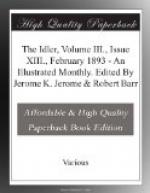The traces left by Love in life are so numerous and diverse that I am almost tempted to the hypothesis that it really exists. There seems to be no other way of accounting for the facts. When you start learning a new language you always find yourself confronted with the verb “to love”—invariably the normal type of the first conjugation. In every language on earth the student may be heard declaring, with more zeal than discretion, that he and you and they and every other person, singular or plural, have loved, and do love, and will love. “To love” is the model verb; expressing the archetype of activity. Once you can love grammatically there is a world of things you may do without stumbling. For, strange to say, “to love,” which in real life is associated with so much that is bizarre and violent, is always “regular” in grammar, and this without barring accidence of any kind. For ancient and modern tongues tell the same tale—from Hebrew to street-Arabic, from Greek to the elephantine language that was “made in Germany.” Not only is “to love” deficient in no language (as home is deficient in French, and Geist in English), but it is never even “defective.” No mood or tense is ever wanting—a proof of how it has been conjugated in every mood and tense of life, in association with every variety of proper and improper noun, and every pronoun at all personal. Not merely have people loved unconditionally in every language, but there is none in which they would not have loved, or might not have loved, had circumstances permitted; none in which they have not been loved, or (for hope springs eternal in the human breast) have been about to be loved. Even woman has an Active Voice in the matter; indeed, “to love” is so perfect that, compared with it, “to marry” is quite irregular. For, while “to love” is sufficient for both sexes, directly you get to marriage you find in some languages that division has crept in, and that there is one word for the use of ladies and another for gentlemen only. Turning from the evidence enshrined in language to the records of history, the same truth meets us at any date we appoint. Everywhere “’Tis love that makes the world go round,” though more especially in ball-rooms. It is awful to think what would have happened if Eve had not accepted Adam. What could have attracted her if it was not love? Surely not his money, nor his family. For these she couldn’t have cared a fig-leaf. Unfortunately, the daughters of Eve have not always taken after their mother. The statistics of crime and insanity testify eloquently to the reality of love, arithmetic teaching the same lesson as history and grammar. Consider, too, the piles of love at Mudie’s! A million story-tellers in all periods and at all places cannot have told all stories, though they have all, alas! told the same story. They must have had mole-hills for their mountains, if not straw for their bricks. There are those who, with Bacon, consider love a variety of insanity; but it is more




